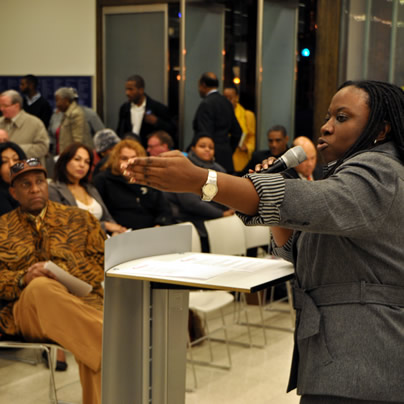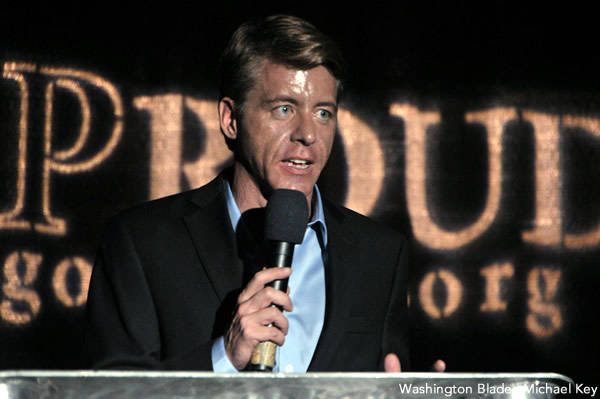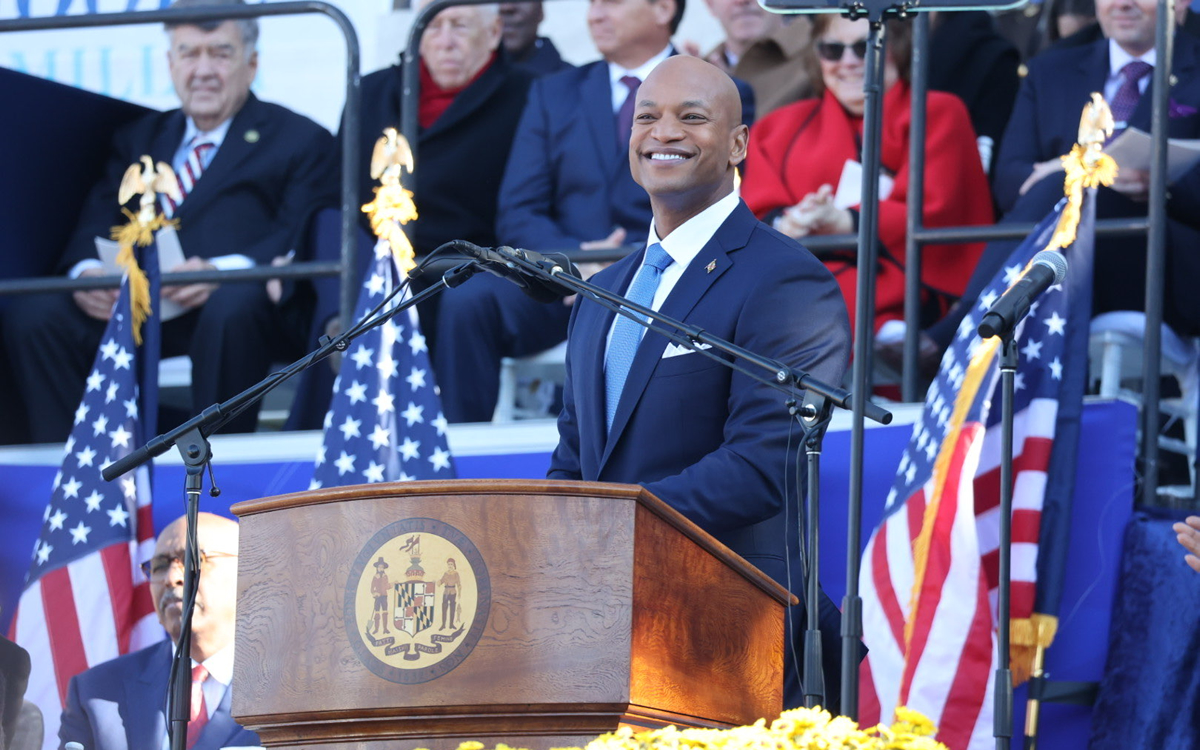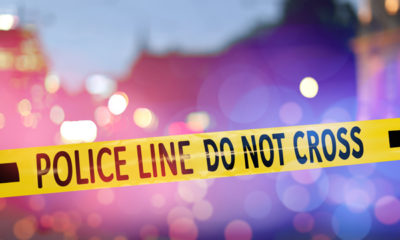Local
Stein Club won’t endorse for ‘non-Democratic’ at-large Council seat
GOProud endorses gay libertarian over Norton for D.C. congressional seat


GOProud, the national LGBT conservative group, whose Executive Director Jimmy LaSalvia is pictured here, endorsed gay Libertarian Party candidate Bruce Majors, who is running against Eleanor Holmes Norton for the city’s congressional delegate seat. (Washington Blade file photo by Michael Key)
The Gertrude Stein Democratic Club, the city’s largest LGBT political group, was unable to make an endorsement Tuesday night in the hotly contested race for an at-large D.C. Council seat that must go to a non-Democratic candidate.
Incumbent Councilmember Michael Brown (I-At-Large) came in first place with 48.6 percent of the vote and challenger David Grosso, also an independent, came in second with 40.5 percent in a second ballot vote as announced by Stein Club President Lateefah Williams. A vote for the option of “no endorsement” came to 10.8 percent.
Brown fell short of a required 60 percent vote needed for an endorsement under the Stein Club’s rules.
“It is an honor to have received the [most] votes from the members of the Gertrude Stein Democratic Club and to be recognized for my one-hundred percent record on LGBTQ issues,” Brown said in a statement released Wednesday.
Grosso, who, like Brown, is campaigning aggressively for votes from the LGBT community, said he was pleased with the support he received as a candidate with less name recognition than Brown.
“Given my first shot at this, I’m really pleased with the outcome,” he said following the vote. “I had a lot of great supporters in the crowd tonight and it was an honor to be here and do this.”
In a first ballot vote, Brown received 43.6 percent of the vote compared to 38.5 percent received by Grosso. Independent candidate A.J. Cooper received 5.1 percent of the first ballot vote and Statehood Green Party candidate Ann Wilcox received 2.6 percent in the first ballot competition, according to Williams.The option of “no endorsement” received 7.7 percent of the vote in the first ballot round.
Cooper and Wilcox were eliminated in the second ballot runoff, which is limited to the two highest vote-getters under club rules.
Williams said 39 club members voted in first round of voting and 37 members voted in the second ballot round.
The vote took place following a Stein Club sponsored forum in which the four candidates appeared at the Human Rights Campaign’s Equality Center meeting hall, where the event was held.
Independent candidate Leon Swain Jr. and Republican candidate Mary Brooks Beatty didn’t attend the forum and the two received no votes from club members.
On the Nov. 6 election ballot, city voters have the option of voting for any two of the seven candidates competing for two at-large seats in play, including incumbent Democrat Vincent Orange, who won the Stein Club endorsement earlier this month and didn’t participate in the club’s forum on Tuesday. Although a Democrat, or majority party candidate, is only eligible for one of the two seats, under the city’s election law a non-Democrat can hold both seats if he or she comes in first and second place and the Democrat finishes third or lower.
However, a Democrat has won one of the two at-large seats in every election since the city’s modern home rule government was put in place in 1974.
The four candidates that participated in Tuesday night’s Stein Club forum answered a wide range of questions on LGBT and non-LGBT issues from longtime D.C. Democratic activist and city voting rights advocate Eugene Kinlow, who served as moderator. The candidates also responded to written questions submitted by members of the audience.
All four expressed strong support for LGBT equality, including same-sex marriage rights. But it became clear from audience members that Brown and Grosso had the most support. According to club members, Brown has voted for, introduced, or signed on as a co-sponsor to virtually all LGBT supportive bills or amendments that have come before the Council since he first won election to the seat in 2008
Grosso noted during the forum that he has worked on LGBT related issues as a staff member to former D.C. Council member Sharon Ambrose (D-Ward 6), who now serves as his campaign chairperson; and for Congressional Delegate Eleanor Holmes Norton (D-D.C.). Norton and Ambrose are considered among the city’s strongest LGBT community supporters who have held elective office.
Gay libertarian challenges Norton
In other local election news, gay Libertarian Party candidate Bruce Majors, who is running against Norton for the city’s congressional delegate seat, won the endorsement this week of GOProud, the national LGBT conservative group that has also endorsed Mitt Romney for president.
“I am running to give people someone to vote for, and to build the local Libertarian Party, and to get the minimum number of votes for them to get ballot status so they can run multiple candidates without the oppressive expense of collecting 5000 signatures for each one each time,” Majors told the Blade.
Majors is one of 24 U.S. House candidates endorsed by GOProud and the one only who isn’t a Republican.
Stein Club set to honor activists at leadership awards event
The Stein Club was scheduled to honor six LGBT activists and one organization Thursday night at its 36th Anniversary Leadership Awards reception for their distinguished serve to the LGBT community. The honorees include:
- Paul Kuntzler, Stein Club co-founder, Dr. Frank Kameny Pioneer Award
- Marylanders for Marriage Equality, Richard Rausch Equality Award
- Danielle Moodie-Mills, advisor for LGBT Policy and Racial Justice, Center for American Progress, Michael Bustamonte and James Zais Political Development Award
- David Perez, president, Latino GLBT History Project, Justice Award
- Jeri Hughes, Transgender Advocate, Transgender Health Empowerment, Heil-Balin Community Service Award
- Greg Cendana, Executive Director, Asian Pacific American Labor Alliance, Desi Deschaine Young Democrat of the Year Award
- Jerame Davis, Executive Director, National Stonewall Democrats, Wanda Alston Democratic Service Award
District of Columbia
Weekend brings two shootings in U Street, Dupont Circle areas
Man dies after incident at Desperados

A man was shot to death shortly after 1 a.m. on Saturday, April 27, inside the Desperados Burgers & Bar at 1342 U St., N.W., which is located on the same block a short distance away from the LGBTQ nightclub Bunker D.C. and around the corner less than a block away from the recently opened LGBTQ bar Crush on 14th Street, N.W.
The incident prompted Bunker to post on its Facebook page a message saying its security team quickly ushered patrons standing outside to enter the club and as a precautionary measure prevented patrons from leaving until it was deemed safe to do so.
A D.C. police statement identifies the shooting victim as Kenneth Goins, 43, of Salisbury, Md. The statement says officers on patrol in the 1300 block of U Street, N.W. heard gunshots at about 1:12 a.m. and immediately arrived at Desperados to investigate the incident.
“Officers located a man inside with multiple gunshot wounds,” the statement says. “Despite all life saving efforts, the victim was pronounced dead on the scene,” it says. Neither the statement nor a police incident report pertaining to the shooting provides a description of the person who committed the shooting nor discloses whether any of the customers inside the restaurant and bar witnessed the shooting.
The statement says the police Homicide Branch is investigating the shooting and urges anyone with knowledge of the incident to call police at 202-272-9099. Like all homicide cases, it says the D.C. Metropolitan Police Department offers a reward of up to $25,000 to anyone who provides information that leads to the arrest and conviction of the person or persons responsible for a homicide committed in the District.
“There was a shooting incident on U ST. N.W., just 4 doors down from BUNKER,” the Bunker Facebook post says. “Our security team promptly responded, ensuring the safety of everyone by ushering them inside for cover,” it says. “Currently, the courageous police officers are outside, handling the situation and working diligently to maintain a secure environment for our guests,” the message continues.
“As a responsible establishment, we strongly prioritize your safety, and as a precautionary measure, we will not permit anyone to exit the building until we deem it safe to do so,” the posting says. “Rest assured, we, as the owners, take this matter very seriously, and your safety remains our highest priority.”
The U Street shooting at Desperados Burgers & Bar took place a little over two hours after six people were shot and wounded outside the Decades nightclub at 1219 Connecticut Ave., N.W. near Dupont Circle and near several gay bars on P Street and 17th Street in the Dupont Circle area. Police said none of those who were shot suffered life-threatening injuries
A separate police statement says with the help of several witnesses, police identified and arrested Rennwel Mantock, 29, of Hyattsville, Md., in connection with the shooting on charges of Assault with Intent to Kill, Possession of Unregistered Ammunition, and Possession of an Unregistered Firearm. The statement says a gun belonging to Mantock was recovered on the scene. Court records show a judge has ordered him to be held without bond until a May 7 preliminary hearing.
“The detectives’ investigation determined Mantock opened fire after employees removed him from a nightclub following a dispute,” according to the statement.
A police arrest affidavit filed in D.C. Superior Court says Mantock told police at the time he was apprehended on the scene that he was dancing with a woman at the club when a security guard ordered him to leave and then “grabbed him by the neck and punched him in the face right before dragging him down the steps.” The Decades club states on its website that it has several floors with multiple bars.
According to the arrest affidavit, Mantock told police that one of the security officials punched him in the face again and threw him to the ground after dragging him out the door. It says Mantock “stated that he then pulled out his gun and started shooting” because “he was very upset about the security punching him in the face,” adding that he “began firing at the Decades’ security.”
The affidavit says five of the six people shot were Decades employees.
Gay former Dupont Circle Advisory Neighborhood Commissioner Mike Silverstein, who lives near where the shooting took place, said Decades is not known as a place that LGBTQ people patronize but said the surrounding neighborhood is home to many LGBTQ residents and draws many LGBTQ visitors.

Maryland Gov. Wes Moore on Thursday signed a bill that seeks to combat efforts to ban books from state libraries.
House Bill 785, also known as the Freedom to Read Act, would establish a state policy “that local school systems operate their school library media programs consistent with certain standards; requiring each local school system to develop a policy and procedures to review objections to materials in a school library media program; prohibiting a county board of education from dismissing, demoting, suspending, disciplining, reassigning, transferring, or otherwise retaliating against certain school library media program personnel for performing their job duties consistent with certain standards.”
Moore on Thursday also signed House Bill 1386, which GLSEN notes will “develop guidelines for an anti-bias training program for school employees.”
District of Columbia
Catching up with the asexuals and aromantics of D.C.
Exploring identity and finding community

There was enough commotion in the sky at the Blossom Kite Festival that bees might have been pollinating the Washington Monument. I despaired of quickly finding the Asexuals and Aromantics of the Mid-Atlantic—I couldn’t make out a single asexual flag among the kites up above. I thought to myself that if it had been the Homosexuals of the Mid-Atlantic I would’ve had my gaydar to rely on. Was there even such a thing as ace-dar?
As it turned out, the asexual kite the group had meant to fly was a little too pesky to pilot. “Have you ever used a stunt kite?” Bonnie, the event organizer asked me. “I bought one. It looked really cool. But I can’t make it work.” She sighed. “I can’t get the thing six feet off the ground.” The group hardly seemed to care. There was caramel popcorn and cookies, board games and head massages, a game of charades with more than its fair share of Pokémon. The kites up above might as well have been a coincidental sideshow. Nearly two dozen folks filtered in and out of the picnic throughout the course of the day.
But I counted myself lucky that Bonnie picked me out of the crowd. If there’s such a thing as ace-dar, it eludes asexuals too. The online forum for all matters asexual, AVEN, or the Asexual Visibility and Education Network, is filled with laments: “I don’t think it’s possible.” “Dude, I wish I had an ace-dar.” “If it exists, I don’t have it.” “I think this is just like a broken clock is right twice a day type thing.” What seems to be a more common experience is meeting someone you just click with—only to find out later that they’re asexual. A few of the folks I met described how close childhood friends of theirs likewise came out in adulthood, a phenomenon that will be familiar to many queer people. But it is all the more astounding for asexuals to find each other this way, given that asexual people constitute 1.7% of sexual minorities in America, and so merely .1% of the population at large.
To help other asexuals identify you out in the world, some folks wear a black ring on their middle finger, much as an earring on the right ear used to signify homosexuality in a less welcoming era. The only problem? The swinger community—with its definite non-asexuality—has also adopted the signal. “It’s still a thing,” said Emily Karp. “So some people wear their ace rings just to the ace meet-ups.” Karp has been the primary coordinator for the Asexuals and Aromantics of the Mid-Atlantic (AAMA) since 2021, and a member of the meet-up for a decade. She clicked with the group immediately. After showing up for a Fourth of July potluck in the mid-afternoon, she ended up staying past midnight. “We played Cards against Humanity, which was a very, very fun thing to do. It’s funny in a way that’s different than if we were playing with people that weren’t ace. Some of the cards are implying, like, the person would be motivated by sex in a way that’s absurd, because we know they aren’t.”
Where so many social organizations withered during the pandemic, the AAMA flourished. Today, it boasts almost 2,000 members on meetup.com. Karp hypothesized that all the social isolation gave people copious time to reflect on themselves, and that the ease of meeting up online made it convenient as a way for people to explore their sexual identity and find community. Online events continue to make up about a third of the group’s meet-ups. The format allows people to participate who live farther out from D.C. And it allows people to participate at their preferred level of comfort: while many people participate much as they would at an in-person event, some prefer to watch anonymously, video feed off. Others prefer to participate in the chat box, though not in spoken conversation.
A recent online event was organized for a discussion of Rhaina Cohen’s book, “The Other Significant Others,” published in February. Cohen’s book discusses friendship as an alternative model for “significant others,” apart from the romantic model that is presupposed to be both the center and goal of people’s lives. The AAMA group received the book with enthusiasm. “It literally re-wired my brain,” as one person put it. People discussed the importance of friendship to their lives, and their difficulties in a world that de-prioritized friendship. “I can break up with a friend over text, and we don’t owe each other a conversation,” one said. But there was some disagreement when it came to the book’s discussion of romantic relationships. “It relegates ace relationships to the ‘friend’ or ‘platonic’ category, to the normie-reader,” one person wrote in the chat. “Our whole ace point is that we can have equivalent life relationships to allo people, simply without sex.” (“Allo” is shorthand for allosexual or alloromantic, people who do experience sexual or romantic attraction.)
The folks of the AAMA do not share a consensus on the importance of romantic relationships to their lives. Some asexuals identify as aromantic, some don’t. And some aromantics don’t identify as asexual, either. The “Aromantic” in the title of the group is a relatively recent addition. In 2017, the group underwent a number of big changes. The group was marching for the first time in D.C. Pride, participating in the LGBTQ Creating Change conference, and developing a separate advocacy and activism arm. Moreover, the group had become large enough that discussions were opened up into forming separate chapters for D.C., Central Virginia, and Baltimore. During those discussions, the group leadership realized that aromantic people who also identified as allosexual didn’t really have a space to call their own. “We were thinking it would be good to probably change the name of the Meetup group,” Emily said. “But we were not 100% sure. Because [there were] like 1,000 people in the group, and they’re all aces, and it’s like, ‘Do you really want to add a non-ace person?’” The group leadership decided to err on the side of inclusion. “You know, being less gatekeep-y was better. It gave them a place to go — because there was nowhere else to go.”
The DC LGBT Center now sponsors a support group for both asexuals and aromantics, but it was formed just a short while ago, in 2022. The founder of the group originally sought out the center’s bisexual support group, since they didn’t have any resources for ace folks. “The organizer said, you know what, why don’t we just start an ace/aro group? Like, why don’t we just do it?” He laughed. “I was impressed with the turnout, the first call. It’s almost like we tapped into, like, a dam. You poke a hole in the dam, and the water just rushes out.” The group has a great deal of overlap with the AAMA, but it is often a person’s first point of contact with the asexual and aromantic community in D.C., especially since the group focuses on exploring what it means to be asexual. Someone new shows up at almost every meeting. “And I’m so grateful that I did,” one member said. “I kind of showed up and just trauma dumped, and everyone was really supportive.”
Since the ace and aro community is so small, even within the broader queer community, ace and aro folks often go unrecognized. To the chagrin of many, the White House will write up fact sheets about the LGBTQI+ community, which is odd, given that when the “I” is added to the acronym, the “A” is usually added too. OKCupid has 22 genders and 12 orientations on its dating website, but “aromantic” is not one of them — presumably because aromantic people don’t want anything out of dating. And since asexuality and aromanticism are defined by the absence of things, it can seem to others like ace and aro people are ‘missing something.’ One member of the LGBT center support group had an interesting response. “The space is filled by… whatever else!” they said. “We’re not doing a relationship ‘without that thing.’ We’re doing a full scale relationship — as it makes sense to us.”
CJ Higgins is a postdoctoral fellow with the Alexander Grass Humanities Institute at Johns Hopkins University.
-

 District of Columbia4 days ago
District of Columbia4 days agoCatching up with the asexuals and aromantics of D.C.
-

 South America4 days ago
South America4 days agoArgentina government dismisses transgender public sector employees
-

 Mexico3 days ago
Mexico3 days agoMexican Senate approves bill to ban conversion therapy
-

 Advice3 days ago
Advice3 days agoShould I divorce my husband for the hot new guy in our building?










